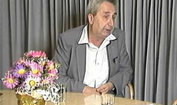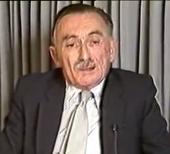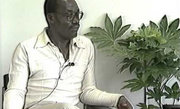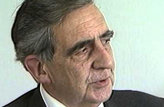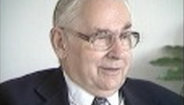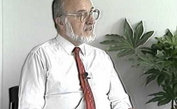Geography Interviews G51-G60
|
|
PAL COLOUR 48 MINS One of Israel's first graduates in geography from the Hebrew University of Jerusalem, Jehoshua Ben-Arieh here describes the formative influences on his choice of specialty, viz., historical geography. After post-graduate studies in London he returned to Israel to launch an ambitious research enterprise on the landscape evolution of this marvelous city, Holy to three world monotheistic religions. Few places or topics could rival nineteenth century Jerusalem for research as well as pedagogical appeal: understanding the past enables one to frame wiser perspectives on the future. Interviewer: Anne Buttimer |
|
|
G 52 ON THE ORIGINS OF ACADEMIC GEOGRAPHY IN ISRAEL: AN INTERVIEW WITH PROFESSOR MOISE BRAWER PAL COLOUR 50 MINS A vivid account of childhood years in the dynamic milieu of Jerusalem during the l920s and l930s by Moise Brawer, one of the first professional geographers in the State of Israel. Studies in England at King's College and the London School of Economics during postwar years provided useful foundations for the organization of University Departments of Geography at Tel-aviv and Bar-Ilan in the l960s. Son of a Viennese geographer and Rabbinical Scholar, Brawer tells of his travels with his father during childhood years, his work on the Encyclopedia Hebraica, the Atlas of Israel, and his enduring research interests in Arab village life, rural development, and the human geography of the Eastern Mediterranean. Interviewer: Anne Buttimer |
|
|
G 53 A WINDOW ON GEOGRAPHY IN ITALY TODAY: AN INTERVIEW WITH PROFESSOR BERARDO CORI PAL COLOUR 21 MINS Italian geographers held high international esteem during the nineteenth and early twentieth centuries. Historically also, Italy has been the cradle of humanism. In Cori's view, Italian geography slumbered during the early twentieth century, with its elegant regional syntheses a la Vidal de la Blache. Mid-twentieth century Italian geographers ignored developments in Anglo-American geography, quantitative methods, planning applications, and other developments. The future, in his view, lies in interdisciplinary efforts and a problem-orientation to research. Interviewer: Anne Buttimer
|
|
|
PAL COLOUR 32 MINS First native graduate in geography, Haughton tells about the early days of the discipline at Trinity College, Dublin, the activities of the Geographical Society, and field excursions through that country's fascinating landscapes. Tireless traveller,geomorphologist and cartographer, promoter of international understanding and cooperation, Haughton has found enormous pleasure in the practice of geography. He radiates an optimism about the future which is profoundly encouraging. Interviewer: Anne Buttimer
|
|
|
G 55 LA GÉOGRAPHIE: EST-ELLE UTILE EN AFRIQUE: AN INTERVIEW WITH PROFESSOR KOLAWOLE SIKIROU ADAM PAL COLOUR 21 MINS Questions are raised about the actual and potential value of geographical research in the analysis and management of major environmental problems in Africa. Professor Adam, who received his postgraduate degree in cartography from Université de Paris VII, here describes his efforts to develop integrated curricula for the training of geographers at the University of Benin, his services to the Association of African Geographers, of which he is now President, and the continuing challenges posed by coastal erosion, desertification, and dramatic population movements in Central Africa today. Interviewer: Daniel Dory |
|
|
PAL COLOUR 21 MINS Initially trained in philosophy at University of Leuven Belgium, Dory conducted anthropological field research in North Africa and later studied psychology and social science in Paris. He is now associated with the CNRS-sponsored Centre de Géohistoire at Université de Paris I. In this interview Dory describes the epistemological research conducted at that centre and expresses strong convictions about geography's need to develop more integrated theories about society and milieu on the one hand, and also to develop sensitivity to the material realities of concrete situations, particularly those involving ecological and environmental crises. Interviewer: Anne Buttimer
|
|
|
PAL COLOUR 31 MINS Initially attracted to geography by the charismatic teaching and research ideas of William William-Olsson and Ivar Högbom, Alexandersson tells about the making of the discipline at the Stockholm School of Economics. Author of The Industrial Structure of American Cities (l956), he explains the development of his own research on airline routing, international shipping, and the geography of port cities. There is no essential contradiction for him between the quest for general principles underlying the human organization of space on the one hand, and the appreciation of uniqueness in particular places on the other; port cities provide telling examples. Interviewer: Anne Buttimer
|
|
|
PAL COLOUR 30 MINS Former President of the International Geographical Union and Emeritus Professor of Geography at the London School of Economics, Michael Wise here describes his childhood experiences in England's "Black Country" during the l930s. After wartime military service in Southeast Asia Wise returned to research and teaching on problems of industrial location and postwar reconstruction design for regional development in the English Midlands. Later appointed to a post at the London School of Economics, he worked in a truly international and interdisciplinary atmosphere and promoted linkages among researchers worldwide - a vision which he continued to pursue within the framework of the International Geographical Union. Interviewer: Anne Buttimer
|
|
|
PAL COLOUR 57 MINS Agriculturalist by birth, biologist at heart, economist by training, and geographer by profession--thus Jerzy Kostrowicki describes his career experiences. The contexts in which this career unfolded is dramatic indeed. Heir to a noble tradition of international diplomacy, art and poetry, Kostrowicki witnessed the vanishing of family fortunes and the challenge of underground military activity during World War II. Later he had the opportunity to study abroad and on his re urn he understook responsibilities for building programmes of research at home as well as networks of international research activity. Presently Director of the Geographical Institute at the Polish Academy of Sciences and world renowned geographer, Kostrowicki has a colourful life story to tell. Interviewer: Anne Buttimer
|
|
|
PAL COLOUR 41 MINS Leading contemporary articulator of French ideas to the Anglo-American world of geographers, Paul Claval here recounts some significant moments in his own career experiences at home and abroad. He comments on the transformations of French geographic thought and practice during the l960s and outlines the emerging humanistic trends of the late l970s and early l980s. The future, in his view, will demand more emphasis on public education, good quality research and writing on the geographical sense of people in various cultures, a keener awareness of the environmental components of human identity, and the roots of Western ideas about Nature, space, and time. Interviewer: David Hooson
|
